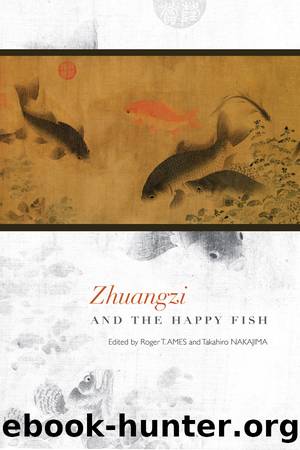Zhuangzi and the Happy Fish by Nakajima Takahiro;Ames Roger T.;

Author:Nakajima, Takahiro;Ames, Roger T.;
Language: eng
Format: epub
Publisher: University of Hawai'i
Select, as equivalents for key terms, native terms which already enjoyed great prestige, and in so doing risk the obliteration of the distinctive meaning of the original concept; or select as equivalents terms which, when used in an explained technical sense, more adequately translate the meaning of the original, but at the cost of familiarity and prestige and at the risk of uncouthness.35
It seems that to translate is always to negotiate between such undesirable choices in an attempt to find conceptual and linguistic equivalents that are, unfortunately, never quite the same, never completely identical. The translation of terms turns out to be nothing more than a compromise reached at the end of this negotiating process, and it is consequently a makeshift, and unacceptable to the staunch purist, who demands nothing less than the unadulterated essence of the original. The frequent complaint is that the Chinese language, which is allegedly too concrete and this-worldly, cannot express the spiritual meanings of the religious concepts of Christianity. “Is there any convenient method of stating the doctrine of the Trinity, which does not imply the grossest materialism?” asked one Protestant priest in despair. “Who has been fortunate enough to discover a name for sin which does not dash us on the Scylla of civil crime or engulph [sic] us in the Charybdis of retribution for the faults of a former life?”36
According to the purist argument, linguistic and cultural differences are so unbridgeable that foreign ideas, especially those of Western religious thinking that have been molded in a long history from the Hebrews and the Greeks to the modern Europeans, are all untranslatable. Not only that, they are simply inconceivable in the Chinese mind and unavailable to the Chinese language. That is roughly the argument Ricci’s opponents advanced against his assimilation of Chinese views and terms in propagating Christianity through cultural accommodation. They complained that the Chinese men of letters converted by Ricci remained as Confucian as ever and had no real understanding of Christianity and that “where they appear to speak of our God and his Angels,” as the Franciscan father Antonio de Caballero remarks with obvious impatience and scorn, “they are merely aping the Truth.”37 Caballero’s remark takes cultural difference as a matter of right or wrong, truth or deception, and his simian metaphor serves to expose the Chinese converts as fake Christians or inadequate imitators.38 This should remind us of the ominous implications of the relativist position, the fact that when the cultural supremacists mark the fundamental difference and emphasize that they are different from the non-Western Other, they are in effect saying that they are better and superior and that they are the original model distorted by inadequate imitations.
Judging from Confucianism’s tenacious grip on the Chinese mind in late imperial China and the negligible number of Chinese converts whom the missionaries succeeded in proselytizing, no one can overlook the enormous gap between Chinese and Western cultural traditions. In fact, the Jesuit approach of cultural accommodation was itself the outcome of a
Download
This site does not store any files on its server. We only index and link to content provided by other sites. Please contact the content providers to delete copyright contents if any and email us, we'll remove relevant links or contents immediately.
| African | Asian |
| Australian & Oceanian | Canadian |
| Caribbean & Latin American | European |
| Jewish | Middle Eastern |
| Russian | United States |
4 3 2 1: A Novel by Paul Auster(11048)
The handmaid's tale by Margaret Atwood(6852)
Giovanni's Room by James Baldwin(5878)
Big Magic: Creative Living Beyond Fear by Elizabeth Gilbert(4723)
Asking the Right Questions: A Guide to Critical Thinking by M. Neil Browne & Stuart M. Keeley(4574)
On Writing A Memoir of the Craft by Stephen King(4213)
Ego Is the Enemy by Ryan Holiday(3991)
Ken Follett - World without end by Ken Follett(3972)
The Body: A Guide for Occupants by Bill Bryson(3800)
Bluets by Maggie Nelson(3709)
Adulting by Kelly Williams Brown(3670)
Guilty Pleasures by Laurell K Hamilton(3586)
Eat That Frog! by Brian Tracy(3514)
White Noise - A Novel by Don DeLillo(3434)
The Poetry of Pablo Neruda by Pablo Neruda(3366)
Alive: The Story of the Andes Survivors by Piers Paul Read(3310)
The Bookshop by Penelope Fitzgerald(3225)
The Book of Joy by Dalai Lama(3217)
Fingerprints of the Gods by Graham Hancock(3212)
